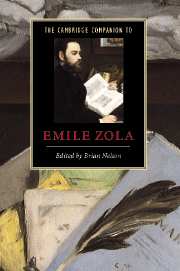Book contents
- Frontmatter
- 1 Zola and the nineteenth century
- 2 Family histories and family plots
- 3 Zola and the representation of society
- 4 Questions of sexuality and gender
- 5 Zola and contemporary painting
- 6 Zola and the art of fiction
- 7 Thérèse Raquin: animal passion and the brutality of reading
- 8 Nana: the world, the flesh and the devil
- 9 Germinal: the gathering storm
- 10 La Bête humaine: Zola and the poetics of the unconscious
- 11 Zola’s utopias
- 12 ‘J’accuse...!’: Zola and the Dreyfus Affair
- Further reading
- Index
7 - Thérèse Raquin: animal passion and the brutality of reading
Published online by Cambridge University Press: 28 May 2007
- Frontmatter
- 1 Zola and the nineteenth century
- 2 Family histories and family plots
- 3 Zola and the representation of society
- 4 Questions of sexuality and gender
- 5 Zola and contemporary painting
- 6 Zola and the art of fiction
- 7 Thérèse Raquin: animal passion and the brutality of reading
- 8 Nana: the world, the flesh and the devil
- 9 Germinal: the gathering storm
- 10 La Bête humaine: Zola and the poetics of the unconscious
- 11 Zola’s utopias
- 12 ‘J’accuse...!’: Zola and the Dreyfus Affair
- Further reading
- Index
Summary
Controversy greeted Thérèse Raquin, Zola's major pre-Rougon-Macquart novel, when it was published in December 1867. Writing in Le Figaro in January 1868, 'Ferragus' (Louis Ulbach) blasted the novel as 'a pool of mud and blood' and a wholly representative example of 'the utter filth that is contemporary literature'. Edmond and Jules de Goncourt, whose work encouraged Zola's interest in heredity and hysteria, countered such critical vitriol with copious praise for the novel's 'admirable autopsy of remorse'. Polemic would prove a highly effective marketing tool, stirring keen public interest and generating impressive sales figures, as Zola anticipated when he launched a vigorous self-defence in the form of a preface to the novel's second edition (April 1868). (I shall return to the preface, for this statement of naturalist intent relates in complex and ambivalent ways to Zola's narrative craft.)
Zola's earliest commercial success has become an enduringly popular novel, one that has inspired related projects in a variety of media: Zola's own stage adaptation was first performed in 1873; Jacques Feyder made a silent movie based on the novel in 1928; Marcel Carné's 1953 film adaptation with Simone Signoret became a classic; and versions for television emerged in 1965 and, in mini-series format, in 1980 and 2002. Tobias Picker's opera Thérèse Raquin was premiered by the Dallas Opera in 2001 and reprised by opera companies in Montreal, San Diego and London (in March 2006), and, at the time of writing, a new film version with Kate Winslet in the role of Thérèse and Judi Dench as Madame Raquin is in pre-production.
- Type
- Chapter
- Information
- The Cambridge Companion to Zola , pp. 105 - 120Publisher: Cambridge University PressPrint publication year: 2007
- 6
- Cited by

